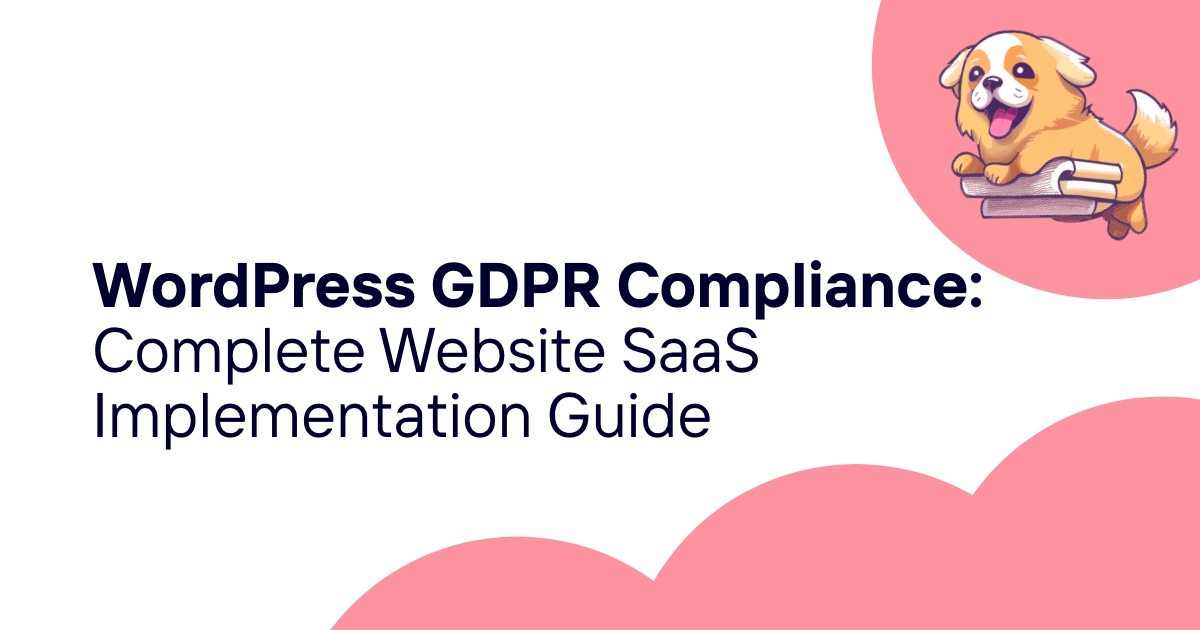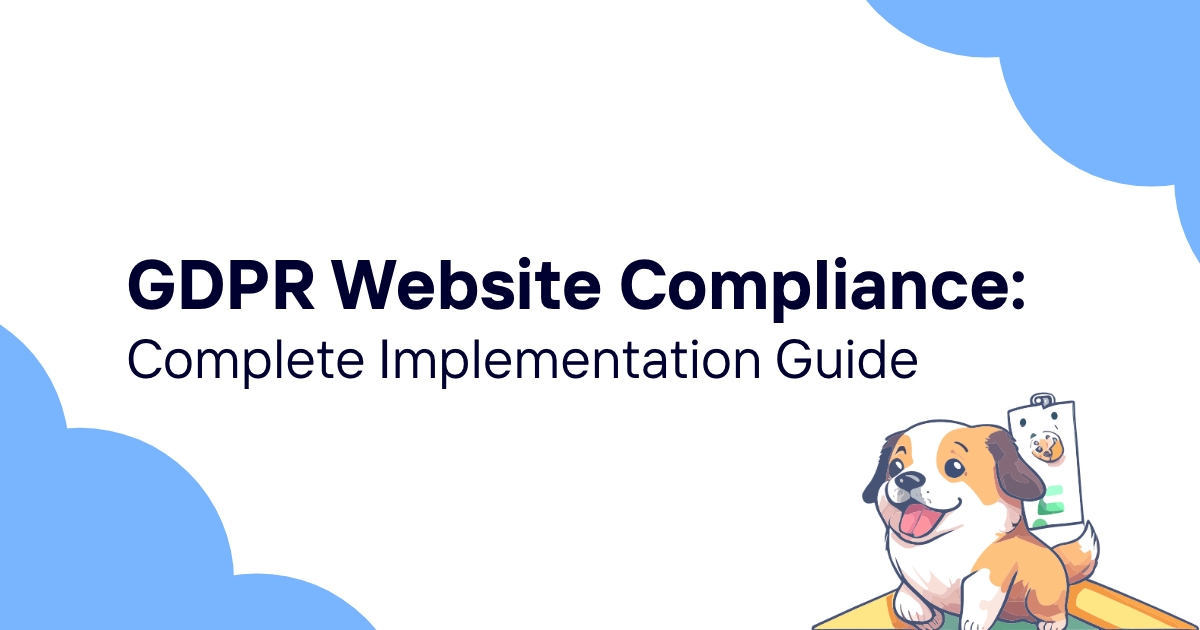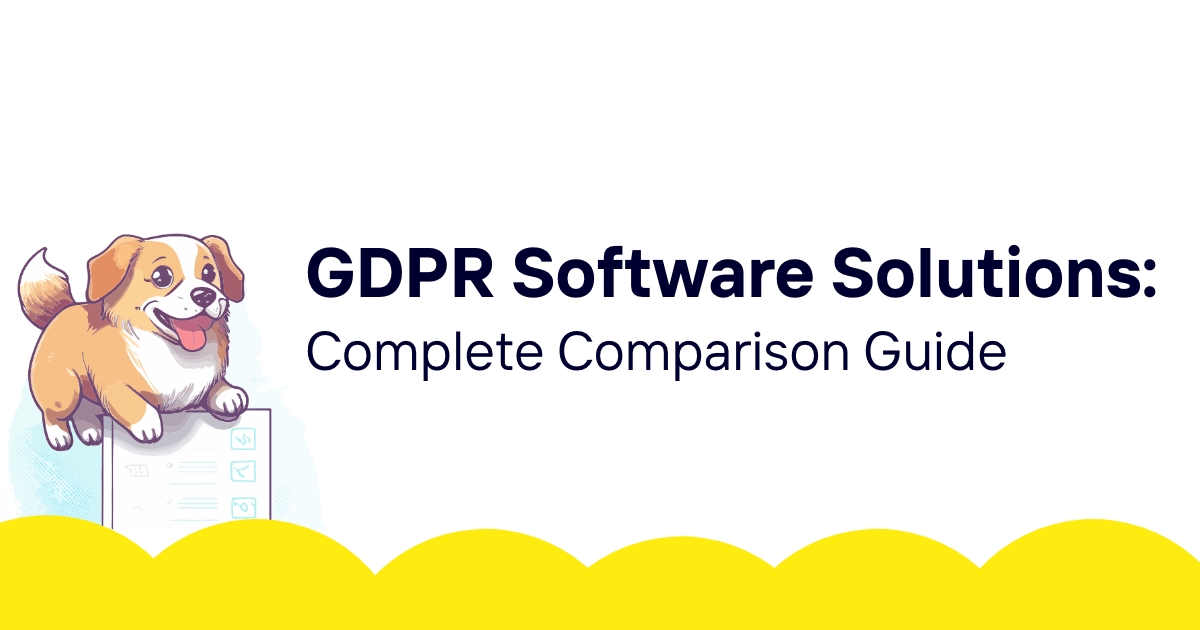WordPress powers over 40% of all websites, making GDPR compliance a critical concern for millions of website owners serving European users. While WordPress includes built-in privacy tools, achieving comprehensive GDPR compliance requires understanding how themes, plugins, hosting configurations, and third-party integrations affect personal data processing throughout your website ecosystem.
The complexity of WordPress GDPR compliance lies not just in the core platform, but in the thousands of plugins, themes, and services that extend WordPress functionality. Each component potentially collects, processes, or shares personal data in ways that create compliance obligations and privacy risks that website owners must manage systematically.
WordPress SaaS websites face particular challenges because they often combine content management with customer data collection, subscription management, contact forms, e-commerce functionality, and marketing automation that each create distinct GDPR requirements and implementation challenges.
Successful WordPress GDPR compliance requires coordinated implementation across multiple layers including server configuration, WordPress core settings, plugin management, theme customization, and third-party service integration. This comprehensive approach transforms privacy protection from compliance burden into competitive advantage that builds user trust and supports international expansion.
ComplyDog helps WordPress website owners navigate GDPR compliance by providing systematic privacy assessment, automated compliance monitoring, and comprehensive documentation that addresses the full complexity of WordPress privacy management.
WordPress GDPR Requirements for SaaS Websites
WordPress SaaS websites face unique GDPR challenges that combine content management with customer data processing, subscription handling, and service delivery that each create specific compliance obligations.
WordPress Core GDPR Features:
WordPress includes privacy tools since version 4.9.6 including privacy policy templates, user data export functionality, user data erasure tools, and privacy-focused comments system that provide foundational compliance capabilities.
However, these core features only address basic WordPress functionality and don't cover plugins, themes, or third-party services that most SaaS websites depend on for customer management and business operations.
SaaS-Specific Data Processing:
WordPress SaaS websites typically process personal data for multiple purposes including user account management, content delivery, subscription billing, customer support, and service analytics that require comprehensive privacy protection.
Document all data processing activities clearly, identifying legal basis for each purpose while ensuring customers understand how their data supports different aspects of your SaaS service delivery.
Data Controller Responsibilities:
Website owners act as data controllers under GDPR, making them responsible for all personal data processing that occurs through their WordPress sites including data collected by plugins, themes, and integrated services.
This responsibility includes ensuring lawful basis for processing, implementing security measures, handling data subject rights, and coordinating compliance across all website components and service providers.
Multi-Site and Network Considerations:
WordPress Multisite networks create additional complexity where super admins must ensure GDPR compliance across all sites while individual site administrators manage site-specific privacy requirements.
Implement network-wide privacy policies and procedures while providing site-specific tools and guidance that address the unique data processing activities of individual sites within the network.
Development and Staging Environment Privacy:
WordPress development and staging environments often contain copies of production data that require GDPR protection including appropriate access controls, retention limits, and disposal procedures.
Implement development environment data protection that prevents unauthorized access to personal data while supporting legitimate development and testing activities through data minimization and anonymization techniques.
For insights on managing complex website privacy requirements, check out our Shopify GDPR compliance guide which addresses similar multi-component ecommerce challenges.
WordPress Privacy Tools and GDPR Features
WordPress provides built-in privacy tools that form the foundation for GDPR compliance, but require proper configuration and enhancement to address comprehensive privacy requirements.
Privacy Policy Management:
WordPress includes privacy policy creation tools with templates and guided content suggestions that help website owners develop comprehensive privacy notices that address GDPR transparency requirements.
Use WordPress privacy policy tools as starting points while customizing content to address your specific data processing activities, plugins, and third-party services that aren't covered by default templates.
User Data Export Functionality:
WordPress provides automated tools for exporting user data in response to data portability requests, including user profiles, comments, media uploads, and metadata from core WordPress functionality.
However, data exports must be enhanced to include data from plugins, custom fields, and third-party services to provide comprehensive responses that satisfy GDPR portability requirements.
User Data Erasure Tools:
WordPress includes user data erasure functionality that can anonymize or remove user data from core WordPress components including user accounts, comments, and media files.
Coordinate erasure tools with plugin data deletion and third-party service removal to ensure comprehensive data deletion that addresses all personal data processing throughout your website ecosystem.
Personal Data Handling for Comments:
WordPress provides enhanced comment privacy features including IP address anonymization, comment cookies consent, and personal data removal from comments that support GDPR compliance for user-generated content.
Configure comment privacy settings appropriately while considering whether your website's comment functionality requires explicit consent or can rely on legitimate interests for community building and content engagement.
Privacy Settings Configuration:
WordPress privacy settings control data collection, user registration requirements, and information display that affect GDPR compliance and user privacy protection throughout the website experience.
Review privacy settings regularly to ensure configurations align with your privacy policy and GDPR obligations while supporting legitimate website functionality and user experience requirements.
Cookie Consent Management for WordPress SaaS
WordPress cookie compliance requires comprehensive management that addresses WordPress core cookies, plugin cookies, theme cookies, and third-party service cookies through coordinated implementation.
WordPress Core Cookies:
WordPress uses several essential cookies for user authentication, comment forms, and customization that generally don't require consent but should be disclosed in privacy policies and cookie notices.
Document all WordPress core cookies clearly while distinguishing between essential cookies for site functionality and optional cookies for user convenience that might require consent.
Plugin Cookie Assessment:
WordPress plugins often set cookies for analytics, social media integration, e-commerce functionality, and marketing automation that require consent management and appropriate privacy disclosure.
Audit all installed plugins for cookie usage, implementing consent mechanisms for non-essential cookies while ensuring plugin functionality remains available for users who provide appropriate consent.
Cookie Consent Implementation:
Implement cookie consent banners that provide clear information about cookie categories, purposes, and data processing while allowing granular consent choices that respect user preferences.
Choose cookie consent solutions that integrate well with WordPress while providing technical blocking capabilities that prevent non-essential cookies from loading without appropriate user consent.
Google Analytics and Marketing Cookies:
Many WordPress sites use Google Analytics, Google Ads, Facebook Pixel, and other marketing tools that set tracking cookies requiring explicit consent under GDPR for behavioral advertising and detailed analytics.
Implement consent-dependent loading for marketing and analytics tools while considering privacy-focused alternatives that provide business insights without extensive personal data processing.
Cookie Policy Documentation:
Maintain comprehensive cookie policies that explain all cookies used by your WordPress site including purposes, retention periods, and third-party sharing that might occur through cookie-based tracking.
Update cookie documentation regularly as plugins and services change while ensuring cookie policies remain accurate and accessible to users making consent decisions.
Contact Form and Lead Generation GDPR Compliance
WordPress contact forms and lead generation tools create significant GDPR obligations because they typically collect personal data directly from users for marketing and customer relationship purposes.
Contact Form Data Processing:
WordPress contact forms collect names, email addresses, phone numbers, and message content that require clear privacy notices, appropriate consent, and secure handling throughout the inquiry process.
Implement contact form privacy notices that explain data collection purposes, retention periods, and use limitations while providing consent options for different types of follow-up communication.
Lead Generation Consent:
Lead generation forms for newsletter subscriptions, content downloads, and service inquiries require explicit consent for marketing communications while supporting legitimate business communication needs.
Design lead generation processes that provide clear consent choices about different types of marketing communication while explaining the value users receive in exchange for their personal data.
Form Data Storage and Retention:
Contact form data stored in WordPress databases or transmitted to third-party services requires appropriate retention policies, access controls, and deletion procedures that align with GDPR requirements.
Implement automated retention management for form submissions while ensuring necessary data remains available for customer service and legitimate business purposes within appropriate timeframes.
Integration with Email Marketing:
Contact forms often integrate with email marketing platforms like Mailchimp, ConvertKit, or HubSpot that create additional GDPR obligations for data sharing and marketing automation.
Ensure email marketing integrations include appropriate consent pass-through and data processing agreements while providing users with clear information about third-party data sharing and processing.
Form Spam Protection:
Anti-spam measures like CAPTCHA, hidden fields, and IP logging collect additional personal data that requires GDPR consideration and appropriate privacy disclosure in form privacy notices.
Balance spam protection needs with privacy minimization principles while ensuring anti-spam measures don't create unnecessary personal data collection or processing obligations.
WordPress Plugin Privacy Compliance Assessment
WordPress plugins create the most complex GDPR compliance challenges because each plugin potentially collects and processes personal data in ways that website owners must assess and manage systematically.
Plugin Privacy Assessment Framework:
Develop systematic approaches for evaluating plugin privacy practices including data collection, processing purposes, third-party sharing, security measures, and user rights support before installation.
Create plugin evaluation checklists that address GDPR requirements including data minimization, consent management, transparency, and security protection for all personal data processing activities.
Popular Plugin GDPR Considerations:
Common WordPress plugins have specific GDPR implications:
- WooCommerce - E-commerce functionality with customer accounts, payment processing, and order management
- Contact Form 7/Gravity Forms - Contact data collection and storage
- Yoast SEO - Search optimization features that might track user behavior
- Jetpack - WordPress.com integration with analytics and social features
- Akismet - Comment spam protection using IP addresses and content analysis
Research GDPR compliance for all installed plugins while implementing appropriate privacy controls and user notifications for plugin-specific data processing.
Plugin Data Processing Agreements:
Commercial plugins that process personal data on your behalf should provide data processing agreements that define roles, responsibilities, and compliance obligations under GDPR.
Many plugin developers now provide GDPR compliance documentation and DPAs, but website owners should ensure agreements address specific use cases and compliance requirements.
Plugin Update Privacy Impact:
Plugin updates can change data processing activities, add new features that collect personal data, or modify privacy settings that affect GDPR compliance and require privacy notice updates.
Implement plugin update procedures that include privacy impact assessment for significant changes while maintaining security through timely updates that don't compromise privacy protection.
Custom Plugin Development:
Custom plugins developed specifically for your WordPress site require comprehensive privacy assessment including data collection practices, security implementation, and user rights support throughout the development process.
Build privacy considerations into custom plugin development from design phase while ensuring custom functionality meets GDPR requirements for data protection and user rights support.
WordPress Database and Hosting GDPR Considerations
WordPress database and hosting configurations create foundational GDPR obligations that affect all personal data processing and require appropriate technical and organizational measures.
Database Security Configuration:
WordPress databases containing personal data require appropriate security measures including encryption, access controls, backup protection, and monitoring that meet GDPR security requirements.
Implement database security best practices including regular security updates, strong authentication, encrypted connections, and appropriate firewall protection for database access.
Hosting Provider GDPR Compliance:
WordPress hosting providers act as data processors under GDPR, requiring appropriate data processing agreements that define security responsibilities, data location, and compliance support.
Choose hosting providers that offer GDPR-compliant services including appropriate security measures, data processing agreements, and support for data subject rights processing.
Data Backup and Recovery:
WordPress backups containing personal data require GDPR protection including encryption, access controls, retention limits, and appropriate disposal when backups are no longer needed.
Implement backup procedures that protect personal data while supporting business continuity and disaster recovery through encrypted storage and appropriate access controls.
Server Location and Data Transfers:
WordPress hosting location affects GDPR compliance for data transfers, particularly when using content delivery networks, backup services, or hosting providers with international infrastructure.
Document data transfer arrangements with hosting providers while ensuring appropriate transfer mechanisms are in place for all jurisdictions where personal data might be processed or stored.
Database Cleanup and Optimization:
WordPress database optimization and cleanup procedures must consider GDPR retention requirements while removing unnecessary personal data that accumulates through normal website operations.
Implement database maintenance procedures that support performance optimization while ensuring personal data deletion aligns with GDPR retention requirements and user deletion requests.
WordPress GDPR Maintenance and Updates
Maintaining WordPress GDPR compliance requires ongoing attention to core updates, plugin changes, security patches, and regulatory developments that affect privacy protection requirements.
WordPress Core Update Privacy Impact:
WordPress core updates can affect privacy features, change default settings, or introduce new functionality that impacts GDPR compliance and requires privacy notice updates.
Monitor WordPress core update release notes for privacy-related changes while testing updates in staging environments to identify privacy impact before deploying to production sites.
Plugin and Theme Update Management:
Plugin and theme updates can change data processing activities, add new privacy features, or modify existing functionality in ways that affect GDPR compliance and user privacy protection.
Implement update management procedures that include privacy impact assessment for significant plugin changes while maintaining security through timely updates.
Privacy Policy Maintenance:
WordPress privacy policies require regular updates to reflect changes in data processing activities, plugin installations, service integrations, and regulatory interpretation of GDPR requirements.
Schedule regular privacy policy reviews while implementing change management procedures that ensure privacy notices remain accurate and comprehensive as website functionality evolves.
User Rights Request Processing:
Ongoing user rights management requires systematic procedures for handling data access, correction, deletion, and portability requests while coordinating responses across all website components and services.
Develop efficient user rights processing workflows that can handle requests comprehensively while meeting GDPR response timeline requirements and maintaining appropriate verification procedures.
Compliance Monitoring and Reporting:
Regular compliance monitoring helps identify GDPR gaps, track privacy performance metrics, and demonstrate ongoing commitment to privacy protection through systematic assessment and improvement.
Implement compliance dashboards that track key privacy metrics including consent rates, user rights processing, security incidents, and privacy policy updates to support continuous improvement.
Security Incident Response:
WordPress security incidents involving personal data require GDPR breach notification procedures that must be coordinated with technical incident response and business continuity planning.
Develop comprehensive incident response procedures that address both technical security response and GDPR notification requirements while supporting business operations during security events.
Ready to achieve comprehensive WordPress GDPR compliance? Use ComplyDog and transform privacy protection from technical challenge to competitive advantage through systematic compliance management that covers all aspects of WordPress privacy requirements.


















